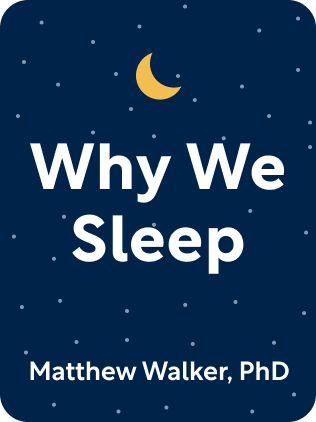

This article is an excerpt from the Shortform summary of "Why We Sleep" by Matthew Walker. Shortform has the world's best summaries of books you should be reading.
Like this article? Sign up for a free trial here .
What are some common sleep disorders, and why do they happen? Is there a way to fix them?
When you think of common sleep disorders, you may think of insomnia or sleepwalking. Those are two major disorders, but sleep is complicated, and there are more. Read about some of the most common sleep disorders, why they happen, and possible ways to help.
Common Sleep Disorders
We’ve talked before about how sleep deprivation causes disease. Now we’ll discuss common sleep disorders, or primary issues with abnormal sleep, and their consequences.
1. Somnambulism / Sleepwalking
Sleepwalking is the act of walking and performing other behaviors while asleep. Automatic, nonconscious routines are executed, like brushing teeth or opening the refrigerator.
Sleepwalking happens during NREM sleep, and not REM dreaming sleep (like some think). Neurologically, sleepwalking is accompanied by an unexpected spike in nervous system activity, causing the person to be stuck somewhere between sleep and wakefulness.
Sleepwalking is one of the more common sleep disorders in children rather than adults, for unknown reasons – possibly because kids spend more time in NREM sleep than adults do.
In one of the most extreme cases, a sleepwalker drove 14 miles to an in-laws’ home, stabbed the mother-in-law to death, and strangled the father-in-law (who survived). This person was later acquitted as not being control of his actions. This defense has been tried in later cases (most unsuccessfully).
2. Insomnia
Insomnia is defined as making enough time for sleeping, but having insufficient sleep quantity or quality, for more than 3 months. Symptoms include difficulty falling asleep, waking up in the middle of night, and feeling unrefreshed in the morning. It’s often cited as one of the most common sleep disorders.
When they do sleep, insomniacs have more fragmented REM sleep and shallower brainwaves in NREM.
1 out of 9 people suffers from insomnia. It’s twice as common in women than men, and more common in blacks/Hispanics than whites, for unknown reasons.
The most common triggers of insomnia are emotional concerns or distress. The biological cause is linked to an overactive sympathetic nervous system, which raises body temperature and levels of cortisol/epinephrine. In turn, the thalamus, hippocampus, and amygdala all remain more active than in normal sleeping patients
Given the complex physiology of insomnia, it’s unlikely blunt instruments like sleeping pills will fix the root cause.
3. Narcolepsy
People with narcolepsy show sudden bouts of extreme sleepiness during the day. Some people who are chronically sleep-deprived mistakenly think they’re narcoleptic. The severity of feeling for narcolepsy is far more severe, equivalent to the feeling after 3 consecutive all-nighters. Narcolepsy occurs in just 1 out of 2,000 people
Narcoleptics also suffer other symptoms:
- Sleep paralysis (waking up in REM sleep during muscle atonia), accompanied by a feeling of dread (which comes from being unable to move in response to a possible threat).
- Many UFO sightings are attributed to sleep paralysis
- Cataplexy (sudden loss of muscle control while awake)
- In cataplexy, patients aren’t asleep — they’re fully active but paralyzed.
- These are triggered by strong emotional reactions, both positive and negative (jokes, surprise, a nice shower, playing with kids, a horn when driving)
- To avoid any triggering events, narcoleptics isolate themselves emotionally to avoid cataplexy
How does narcolepsy arise? It’s a disruption in a normal process. Normally, wakefulness is signaled by the neurotransmitter orexin in the hypothalamus; in sleep, this is shut off.
- In narcoleptic patients, 90% of orexin-secreting cells are destroyed, and orexin receptors are downregulated.
- This insufficient signaling causes the body to exist in a “not-awake not-asleep purgatory” throughout the day and night.
There are no current effective treatments for narcolepsy.
- Amphetamine/provigil is used for daytime sleepiness
- Antidepressants suppress REM sleep, which helps with sleep paralysis and cataplexy
- New drugs like suvorexant (meant to block orexin at night) caused patients to fall asleep just 6 minutes faster.
Can Common Sleep Disorders Be Deadly?
Gravely, sleep deprivation can directly cause death.
In rodent studies, REM sleep deprivation causes death over the same period as food deprivation – about 15 days.
- NREM sleep deprivation causes death too, after 45 days.
- Sleep-deprived rats lose body weight, despite eating more. They can no longer regulate their body temperature, causing intense metabolism.
- The immune system is destroyed, causing widespread skin sores.
- The cause of death is universally septicemia or a systemic bacterial infection, caused by the gut microbiome (normally held in check by a functioning immune system).
In humans, sleep deprivation leading to death is uncommon (possibly since the natural urge to sleep is so strong). But lack of sleep could contribute to more acute causes of death like seizures, and thus be misreported.
The strongest evidence that humans can die from sleep deprivation comes with a very rare inherited condition, fatal familial insomnia. In this disease, prion proteins cause the thalamus to be destroyed, and the patient is totally unable to sleep, even with heavy sedatives. Severe disability sets in (dementia, speech disorders), and death occurs within 10 months. There are no treatments or preventions.
- This disease is autosomal dominant and found in only 40 families worldwide.
Common sleep disorders affect people worldwide. People are always looking to remedy common sleep disorders, and science may discover other treatments the more we learn about sleep.

———End of Preview———
Like what you just read? Read the rest of the world's best summary of Matthew Walker's "Why We Sleep" at Shortform .
Here's what you'll find in our full Why We Sleep summary :
- Why you need way more sleep than you're currently getting
- How your brain rejuvenates itself during sleep, and why nothing can substitute for sleep
- The 11-item checklist to get more restful sleep today






